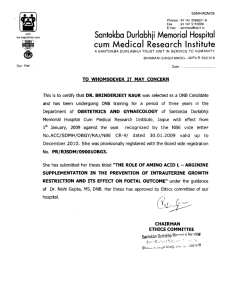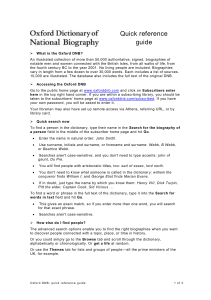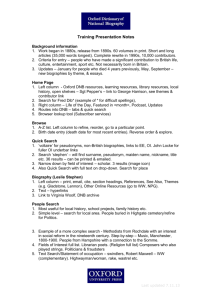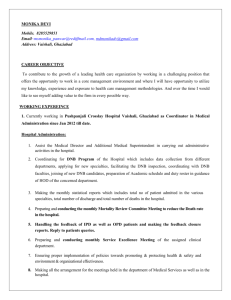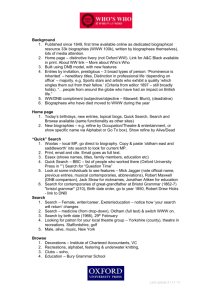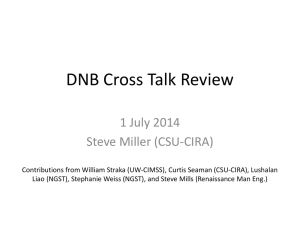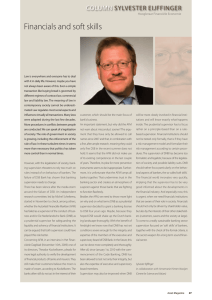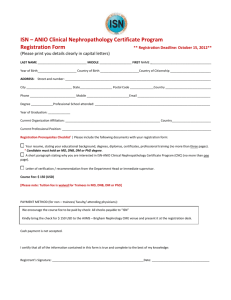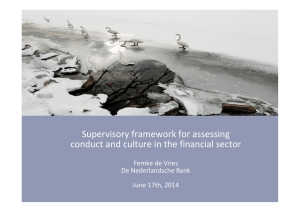DNB Asset Management: Sustainable and responsible investments
advertisement
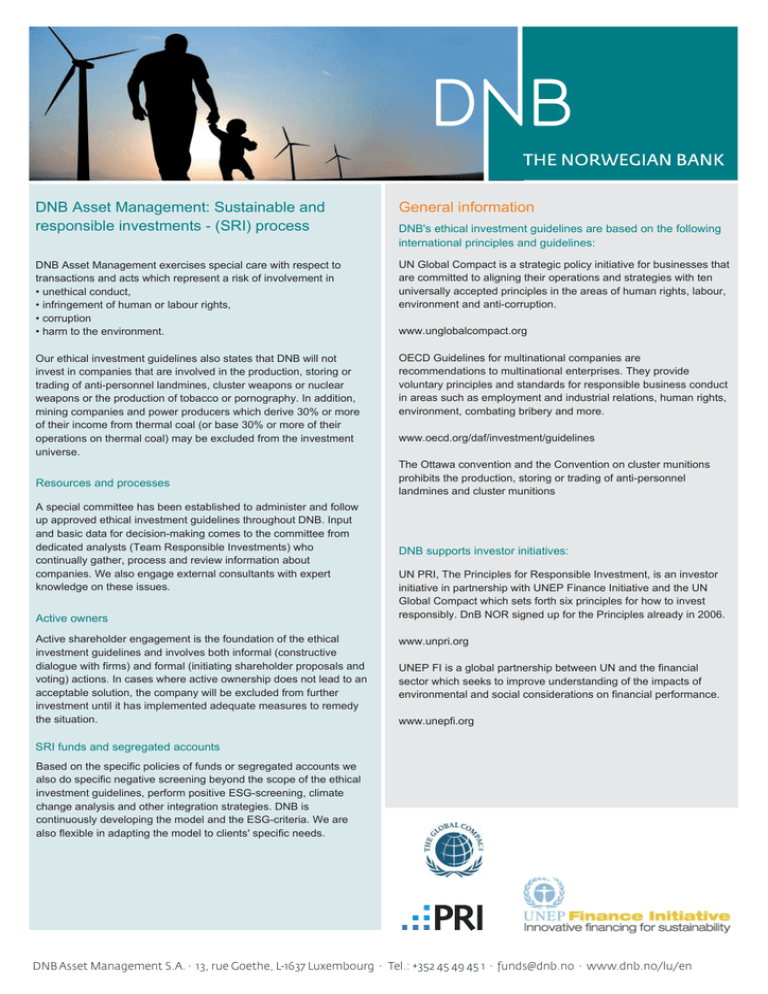
DNB Asset Management: Sustainable and responsible investments - (SRI) process General information DNB Asset Management exercises special care with respect to transactions and acts which represent a risk of involvement in • unethical conduct, • infringement of human or labour rights, • corruption • harm to the environment. UN Global Compact is a strategic policy initiative for businesses that are committed to aligning their operations and strategies with ten universally accepted principles in the areas of human rights, labour, environment and anti-corruption. Our ethical investment guidelines also states that DNB will not invest in companies that are involved in the production, storing or trading of anti-personnel landmines, cluster weapons or nuclear weapons or the production of tobacco or pornography. In addition, mining companies and power producers which derive 30% or more of their income from thermal coal (or base 30% or more of their operations on thermal coal) may be excluded from the investment universe. OECD Guidelines for multinational companies are recommendations to multinational enterprises. They provide voluntary principles and standards for responsible business conduct in areas such as employment and industrial relations, human rights, environment, combating bribery and more. Resources and processes A special committee has been established to administer and follow up approved ethical investment guidelines throughout DNB. Input and basic data for decision-making comes to the committee from dedicated analysts (Team Responsible Investments) who continually gather, process and review information about companies. We also engage external consultants with expert knowledge on these issues. Active owners Active shareholder engagement is the foundation of the ethical investment guidelines and involves both informal (constructive dialogue with firms) and formal (initiating shareholder proposals and voting) actions. In cases where active ownership does not lead to an acceptable solution, the company will be excluded from further investment until it has implemented adequate measures to remedy the situation. DNB's ethical investment guidelines are based on the following international principles and guidelines: www.unglobalcompact.org www.oecd.org/daf/investment/guidelines The Ottawa convention and the Convention on cluster munitions prohibits the production, storing or trading of anti-personnel landmines and cluster munitions DNB supports investor initiatives: UN PRI, The Principles for Responsible Investment, is an investor initiative in partnership with UNEP Finance Initiative and the UN Global Compact which sets forth six principles for how to invest responsibly. DnB NOR signed up for the Principles already in 2006. www.unpri.org UNEP FI is a global partnership between UN and the financial sector which seeks to improve understanding of the impacts of environmental and social considerations on financial performance. www.unepfi.org SRI funds and segregated accounts Based on the specific policies of funds or segregated accounts we also do specific negative screening beyond the scope of the ethical investment guidelines, perform positive ESG-screening, climate change analysis and other integration strategies. DNB is continuously developing the model and the ESG-criteria. We are also flexible in adapting the model to clients' specific needs. DNB Asset Management S.A. · 13, rue Goethe, L-1637 Luxembourg · Tel.: +352 45 49 45 1 · funds@dnb.no · www.dnb.no/lu/en SRI News 2016 Q2 - COMPANY UPDATES: DAM finalized the new guidelines for climate and coal in its ethical guidelines in early 2016. This spring, 52 companies have been excluded from the investment universe of DNB based on the coal criterion. The reason is a breach of the product criterion in the ethical guidelines “mining companies and power producers which themselves or through entities they control derive 30 per cent or more of their income from thermal coal, or base 30 per cent or more of their operations on thermal coal, may be excluded from the investment universe”. These 52 companies are mostly utility companies that base a large share of their power production on burning thermal coal. The companies are based all over the world including China, India, and the US (the three biggest countries in consuming coal globally). Companies operating in Western Sahara have to be particularly careful in not violating major conventions or ethical norms. Chapter XI of the UN Charter pertains to non-self-governing territories. Article 73 stipulates that the economic and political developments in such areas are to take place in accordance with the wishes and interests of the people in the area. This principle has been confirmed in a number of UN resolutions when it comes to Western Sahara. San Leon Energy Plc explores and produces oil and natural gas. The company is involved in onshore hydrocarbon exploration in Western Sahara on behalf of Moroccan authorities – but not in alignment with the wishes and interests of the people in the area. San Leon Energy has a result been excluded from the investment universe of DNB Asset Management (DAM) mainly due to breach of the ethical guidelines “other particularly critical violations of basic ethical norms”. DAM is also engaging in other companies operating in Western Sahara. For example, General Electric Co has assumed operational responsibility for the construction of an electric line built in Western Sahara, the lawfulness of this is being investigated. We have joined engagement activities directed at General Electric. Corruption continues to be a large topic globally. Petroleo Brasileiro SA (Petrobras) is a major listed company, their main activity is the production and refining of oil and gas. The company has been implicated in a large corruption scandal in Brazil (“Lava Jato”), and the US authorities have also started to investigate allegations of corruption. DAM has joined engagement activities with the company. Also in Norway, there has been extensive focus on incidents/allegations of corruption. For example in the telecom sector, Telenor ASA has been criticized for the handling of their partial ownership in VimpelCom Ltd. (VimpelCom has been involved in a corruption scandal in Uzbekistan, but Telenor itself has not been implicated). Telenor seems to have learned from this incident and have done extensive work to improve their risk management and routines for handling corruption. OTHER NEWS Morningstar has now introduced ESG-ratings of all the funds it covers. The key elements are a sustainability score and a sustainability rating. The sustainability rating is relative to other funds in a category and leads to a score of one to five “globes”. DAM’s funds did quite well, and achieved typically three “globes” or better. However, the sustainability rating has to be used with caution; perhaps it is best to use it as a starting point for a deeper analysis of funds. Our SRI analysts Janicke Scheele is Head of Responsible Investments in DNB Asset Management AS. She is in charge of the RI processes, ESG analysis and is working closely with portfolio managers and analysts. Janicke has long experience both as portfolio manager and as investment advisor for institutional clients and holds an MBA degree from Norwegian School of Economics in Bergen. Karl G. Høgtun works as analyst Responsible investments in DNB Asset Management. He joined DNB in 1997. He has long experience, both as financial analyst and as portfolio manager - including being Head of the Nordic equity team. As part of that position, Mr. Høgtun managed the green Nordic fund (DNB Grønt Norden). He holds a MBA from the Arizona State University and a MIM from American Graduate School of Management (Thunderbird). Please contact us for any questions or feedback. DNB Asset Management S.A. · 13, rue Goethe, L-1637 Luxembourg · Tel.: +352 45 49 45 1 · funds@dnb.no · www.dnb.no/lu/en
